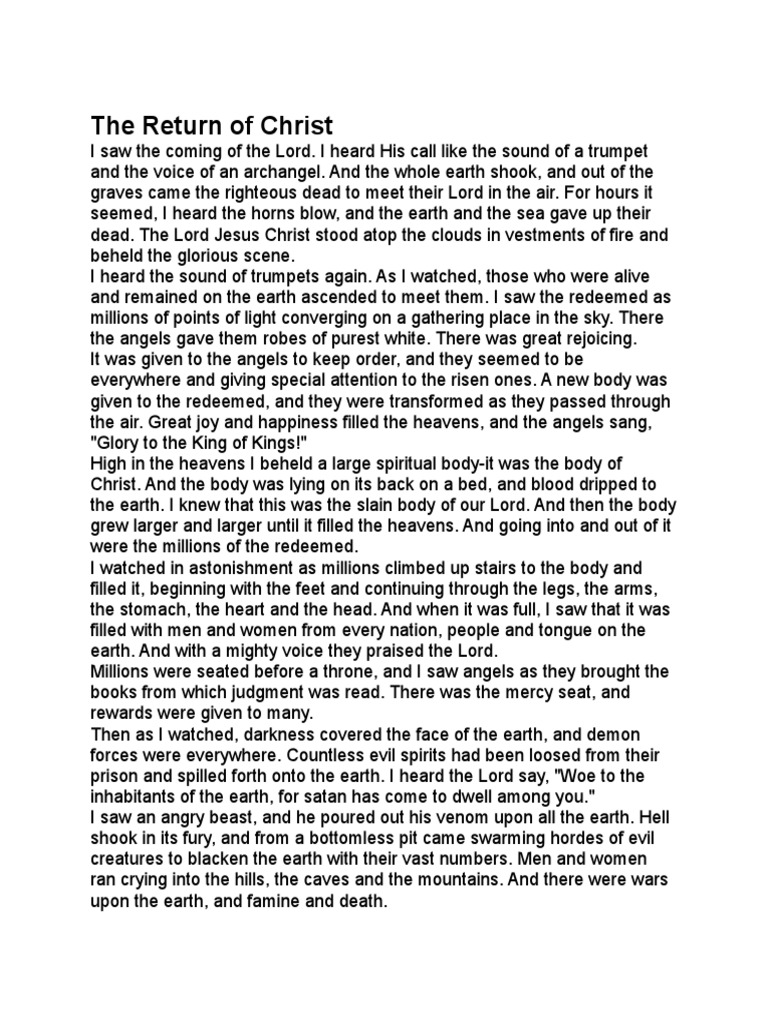The concept of the Return of Christ has been a point of contention and debate for centuries, evoking a spectrum of interpretations across various religious traditions. In the Bahá’í Faith, this idea assumes a distinctive character, rich with profound implications that transcend mere theological conjecture. What does the Return of Christ actually entail, and how do Bahá’í teachings elucidate this pivotal concept? Let’s embark on an intellectual exploration while posing an intriguing question: Could the Return of Christ be less about a singular event and more about an ongoing spiritual transformation within humanity?
To begin with, the Bahá’í perspective on the Return of Christ is predicated on the belief that this phenomenon is not confined to a literal second coming of Jesus as envisioned in traditional Christian theology. Instead, Bahá’ís articulate that the return signifies the advent of a new Manifestation of God. This Manifestation, identified as Bahá’u’lláh, proclaims the fulfillment of Christ’s promise, thereby redefining the essence of spiritual expectations. Such an interpretation invites us to consider how these revelations act as catalysts for spiritual renewal and societal advancement.
Moreover, it is essential to delve into the scriptural foundations supporting this notion. In the Bahá’í writings, Bahá’u’lláh’s mission is framed within the context of the fulfillment of all previous religious prophecies, including those pertaining to the return of Christ. The teachings emphasize the unity of the prophets of God, wherein each serves to progressively reveal divine purpose in accordance with humanity’s evolving needs. Hence, one could ponder: Is the anticipation of the Return a transient belief, or does it signal an enduring, transformative journey towards collective enlightenment?
Throughout history, various religious communities have expressed distinct interpretive lenses regarding the Return of Christ. In Christianity, for instance, the return is often depicted as a cataclysmic event characterized by divine judgment. In sharp contrast, the Bahá’í understanding fosters a more optimistic outlook, which is rooted in the potential for unity and peace. This doctrine emphasizes the transition from an age of fragmentation to an era of unification, positing that Christ’s return is intrinsically linked to humanity’s collective awakening to its shared destiny. Thus, the question arises: How can we reconcile these disparate interpretations in a world rife with diversity?
Exploring the implications of this transformative notion leads us to consider the practical applications of Bahá’í teachings in contemporary society. The assertion that a new Manifestation has arrived invites a reevaluation of existing paradigms surrounding morality, ethics, and social justice. Bahá’u’lláh’s teachings advocate for the establishment of global peace, the elimination of prejudice, and the promotion of the oneness of humanity. The convergence of these principles with the idea of the Return offers a roadmap for a future enriched by spiritual principles—suggesting that the realization of Christ’s return is, in fact, inscribed in our actions and interactions.
Moreover, this notion fosters a sense of agency among individuals. Rather than waiting passively for divine intervention, Bahá’ís are encouraged to become active participants in the realization of the world envisioned by Bahá’u’lláh. The Return is posited not as an external event, but a phenomenon that intricately weaves itself into the fabric of individual lives and communities. Hence, an intriguing challenge emerges: How can believers embody this transformational principle in their everyday actions?
In face of challenges posed by modernity—such as materialism, social discord, and ecological crises—the Bahá’í response emphasizes proactive engagement rooted in spiritual principles. The Return of Christ, through Bahá’í lenses, manifests in acts of service, commitment to justice, and the pursuit of knowledge. Such initiatives resonate with the central Bahá’í tenet that spiritual and material advancements are mutually inclusive. Hence, it provokes the question: As we navigate the complexities of the contemporary world, are we sufficiently harnessing our spiritual insights to sculpt a more harmonious existence?
Furthermore, the concept of the Return extends beyond individual transformation; it encapsulates a communal ethos that seeks global reconciliation. The teachings advocate for collective endeavors that foster mutual understanding across diverse cultures and faiths, thereby igniting a genuine discourse on humanity’s interconnectedness. In this light, the potential for the Return of Christ morphs into a challenge urging society to transcend barriers of segregation and embrace the multifaceted tapestry of human experience. How, then, can we initiate this dialogue of unity?
As we reflect on the Bahá’í interpretation of the Return of Christ, it becomes evident that it is deeply intertwined with the principles of unity, justice, and moral revival. Rather than a confirmation of antiquated dogmas, the Return serves as an invitation—an appeal to humanity to awaken from its collective slumber. This calls for an intentional shift in our worldviews and responses to crises. Could it be possible that the essence of Christ’s return lies not merely in eschatological expectations but in our capacity to foster transformative actions rooted in divine guidance?
In conclusion, the teachings of the Bahá’í Faith concerning the Return of Christ challenge us to reconsider established notions of spirituality and engagement with the world. Rather than anticipating a singular moment of divine intervention, Bahá’í teachings encourage a continuous journey towards holiness and societal betterment. As we confront modern dilemmas and embrace the complexity of human experience, let us ponder the enduring inquiry: Are we truly prepared to embody the transformative energy that the Return of Christ represents in our lives and communities?
